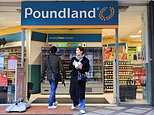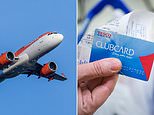Inflation fear as oil and food prices soar
Petrol prices could smash through the £1.30-a-litre barrier within weeks as surging food and energy costs place household finances under renewed pressure.

Oil prices: The price of crude oil is expected to rise again.
Economists sounded the alert that the fragile economic recovery could be put at risk, after the price of food rose to a record high and oil edged closer to $100 a barrel.
Oil prices in London have already climbed to $95 a barrel, with the average price for a litre of petrol rising to 127.21 pence, sparking predictions that inflation will jump to 4% this year.
Crude oil prices jumped again yesterday, after strong US employment numbers led to gains on Wall Street and commodity markets.
London crude rose by as much as $1.67 a barrel to trade at $95.20.
David Buik, market analyst at BGC Partners, said it was just a matter of time before this filtered through to higher petrol prices at the pump.
He said: 'I wouldn't be surprised to see petrol rise to 130p per litre in the next couple of weeks.
'It will take time for the Organisation of the Petroleum Countries and oil producers to take action to calm prices and if we see any further bad weather it will just be used by the forecourt retailers as an excuse to put up prices.'
He added that if the Government wanted to 'take the pressure off the motorist immediately, it has the wherewithal to do it' by temporarily cutting fuel duty.
Experts warn that the timeyear lag between rising crude and pump prices means further rises are likely.
The increase in VAT to 20% this week has already added an average of 2p per litre to the price of fuel, according to the AA.
It says a typical 50-litre tank costs £8.59 more to fill than ago and warns that 'lower income drivers have reached breaking point'.
Oil cartel Opec is under pressure to pump more crude oil in order to calm the rise in oil prices, but so far its members have shown little indication that they want to do so.
Amid predictions that inflation will jump to 4%, some policymakers believe interest rates need to be raised straight away.
Others say the Bank of England must hold fire, arguing that any hike in the cost of borrowing will cripple consumers and could cause numerous companies to go under.
Yesterday, the United Nations' food agency said it was concerned about rising food prices. Its warning comes after the International Energy Agency made clear earlier this week that 'oil prices are entering a dangerous zone for the global economy'.
The UN food agency's index of a basket of foods - which includes cereals, dairy, meat and sugar - hit a record level in November.
Rising oil prices are also putting upward pressure on food prices, because the cost of transporting and processing crops has risen sharply.
And rising crude prices are hurting businesses and individuals, who look set to face even higher petrol and food costs in the coming weeks.
With household finances already stretched, families may well have to make cut backs on non-essential items in order to pay their petrol and food bills.
Most watched Money videos
- Volkswagen teases small and affordable ID.1 electric car
- TWISTED boss Charles Fawcett explains company's love for Land Rovers
- How to invest in credit for an 11% annual return
- One-of-a-kind Aston Martin offered for sale for the first time ever
- A look at the 'blisteringly fast' new Ferrari 12Cilindri Spider
- Octopus CEO: Regional electricity pricing can save the UK £51 billion
- Inside Britain's best-selling EV: The new Tesla Model Y
- Gen X falling behind on saving for retirement, research shows
- Kia launches its new eye-catching and stylish EV3 electric SUV
- The new two-door two-seater Aston Martin Vantage Roadste
- Bar manager and his husband feeling flush after winning OMAZE gem
- No taste buds no problem! Marks and Spencer launch wine AI tool
-
 Major bank set to pay customers £12.5m compensation after...
Major bank set to pay customers £12.5m compensation after...
-
 Volkswagen's affordable small EV: ID.1 will arrive in...
Volkswagen's affordable small EV: ID.1 will arrive in...
-
 Iconic UK chain with 825 stores put up for sale following...
Iconic UK chain with 825 stores put up for sale following...
-
 Are you putting your dog in danger in the car - and...
Are you putting your dog in danger in the car - and...
-
 Now Schroders urges Reeves to cut cash Isa limit - but...
Now Schroders urges Reeves to cut cash Isa limit - but...
-
 Three secrets to becoming an Isa millionaire revealed by...
Three secrets to becoming an Isa millionaire revealed by...
-
 Private parking firms make requests for car owner data...
Private parking firms make requests for car owner data...
-
 Poundland's owner Pepco considers selling struggling...
Poundland's owner Pepco considers selling struggling...
-
 How Tesco Clubcard users can bag 10,000 bonus points when...
How Tesco Clubcard users can bag 10,000 bonus points when...
-
 A third of drivers feel 'less safe' on smart motorways...
A third of drivers feel 'less safe' on smart motorways...
-
 ITV Studios scores record profits despite strikes hitting...
ITV Studios scores record profits despite strikes hitting...
-
 Reckitt hikes dividend for investors amid efficiency drive
Reckitt hikes dividend for investors amid efficiency drive
-
 MARKET WATCH: Melrose leads Footsie sell-off as US tech...
MARKET WATCH: Melrose leads Footsie sell-off as US tech...
-
 Admiral to hand share bonuses worth up to £3,600 to...
Admiral to hand share bonuses worth up to £3,600 to...
-
 Yet MORE rate cuts can't calm 'risky' eurozone, warns ECB...
Yet MORE rate cuts can't calm 'risky' eurozone, warns ECB...
-
 ITV proves the critics wrong: Shares may be up, but...
ITV proves the critics wrong: Shares may be up, but...
-
 Entain profits jump as digital gaming grows - but...
Entain profits jump as digital gaming grows - but...
-
 We're travel experts - here's your ultimate guide to...
We're travel experts - here's your ultimate guide to...

































